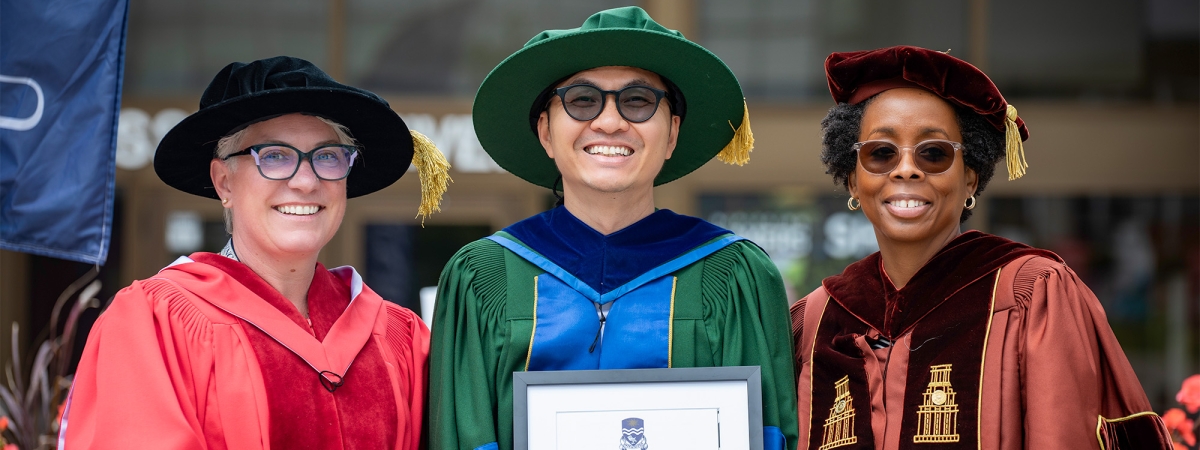Grounded in the context of a post-modern society, and recognizing the importance of multiple perspectives, this Ph.D. in Education (Educational Sustainability) program will prepare students from a variety of fields, such as education, health, social work, social justice and administrative leadership, for sustainable educational practices in the 21st century.
By sustainable practice we mean conducting research, teaching, and learning across disciplines, cultures, and nationalities and embracing a global vision of education that develops self-knowledge and an understanding that the relationship of the self to people, to nature, and to the designed environment is fundamental in becoming an educated person.
Educational Sustainability means that within the program students and faculty members will be asking questions that take into account the social context in which we live, and consider the ways in which the world is interrelated. The purpose is to build capacity to meet the needs of present and future academics and professionals working in various social science fields who will leave the program prepared to move beyond the status quo of 20th century standard practice to create real and virtual educational environments where active learning and multiple perspectives are the foundations of individual and institutional action. The degree is designed for educators within the school system, and within the professions more generally, who will become engaged citizens who can think critically and are prepared to accept individual responsibility for the well-being of society.
For general inquiries regarding the PhD in Education Program please contact us at GradEd@nipissingu.ca
Students must complete the following degree requirements:
- Three core courses during a summer residence program over two years (four weeks each July) at Nipissing University in North Bay.
- Three elective courses from the current MEd/PhD course listings (courses are online).
- A comprehensive examination (two qualifying papers on theory and methodology).
- A doctoral dissertation (may contain quantitative, qualitative, and arts-informed elements).
Through a variety of courses, a comprehensive exam and a Dissertation (research Thesis), the Ph.D. in Education (Educational Sustainability) program has the following learning outcomes for students:
- Draw on a wide variety of theoretical and practical literature to develop a broad understanding of the educational landscape through course readings and through individual research projects.
- Conduct critical conversations about education in the student’s field during course seminars and within research presentations.
- Assume an investigative stance in regard to teaching and learning in order that students can develop a scholarship of teaching and learning through opportunities to conduct seminars and engage in research related to instructional practices in multiple fields.
- Demonstrate an understanding of a range of research methodologies that display an appreciation of the complexity of knowledge and the potential contribution made by diverse interpretations methods and disciplines in both course work and through the development of an in depth research project.
- Engage in original research that contributes to educational knowledge in the student’s field.
- Develop qualities and transferrable skills necessary for employment requiring the exercise of personal responsibility and largely autonomous initiative in complex and unpredictable situations in professional or equivalent environments.
PhD in Education (Educational Sustainability)
Application Process:
A Guide through the Admission Requirements, How to Apply, Admission Process and Registration Instructions
Finances:
Degree Requirements:
- PhD in Education Degree Requirements
- PhD Learning Outcomes
- Graduate Studies Program and Degree Requirements
Funding and Financial Aid
Scholarships, Bursaries and Awards
Funding is available to graduate students from both internal and external sources. Internal funding includes teaching/research assistantships, faculty research grants, and Nipissing Graduate Scholarships. The value of these scholarships varies. Students are also encouraged to compete for scholarships from the Social Sciences and Humanities Research Council (SSHRC), the Natural Science and Engineering Research Council (NSERC), the Canadian Institutes of Health Research (CIHR), the Ontario Graduate Scholarships (OGS), the Canada Graduate Scholarship, and the Mackenzie King Memorial Scholarship.
All PhD candidates are assigned a Faculty Advisor upon entry into the program. When appropriate, candidates will approach/select a Faculty Supervisor who will guide them through the doctoral dissertation process.
Nipissing University not only provides its graduate students with attentive faculty and a supportive community, but also offers physical spaces that are conducive to productive research.
Our graduate students study and teach in state-of-the-art classrooms, seminar rooms, and research labs. Our graduate student lounge and interdisciplinary office provides students with their own dedicated space to meet and collaborate.
The Harris Learning Library was completed in 2011 and provides 56,000 square feet of study space with natural light and a modern award-winning design. The new library features expanded print collections, a learning commons, an adaptive technology area, and collaborative work spaces.
Graduate Student Centre - R229
Nipissing University graduate students have access to an interdisciplinary office facility designed to be a central place for graduate students to study and interact with each other. The Graduate Student Centre totals 833 square feet and is able to accommodate more than 60 students. In addition, the Graduate Student Centre is equipped with a telephone, wireless and hardwired internet, and access to shared printing.
All graduate students are eligible for access to the Graduate Student Centre. Keys are assigned by the Vice-President Operations office, B215. Students are required to pay a $25.00 deposit for a key in the Finance office prior to receiving their key.
There are 30 individual study carrels along the perimeter of the room that are assigned to individual students, or two who request to share. Assignments of designated spaces will be on a first come first serve basis.
Graduate Studies Resources
- Graduate Studies Regulations
- Graduate Studies Procedures
- Graduate Studies Forms
- Graduate Studies Glossary
- Graduate Student Card Application
- Graduate Student Progress Report
- Off Campus Library Services
Major Research Paper/Thesis Resources
- MRP/Thesis Defence Process
- MRP/Thesis Supervisory and Examination Committees
- MRP/Thesis Final Submission Process
PhD in Education Resources
Post-Graduation Opportunities and Careers
Our PhD program prepares students for leadership and advancement with sustainable educational practices in a variety of fields including education, health, social work, business, social justice, and administration. Some pursue careers in academe at colleges and universities. The PhD in Education (Educational Sustainability) program at Nipissing University offers limitless career opportunities!
































